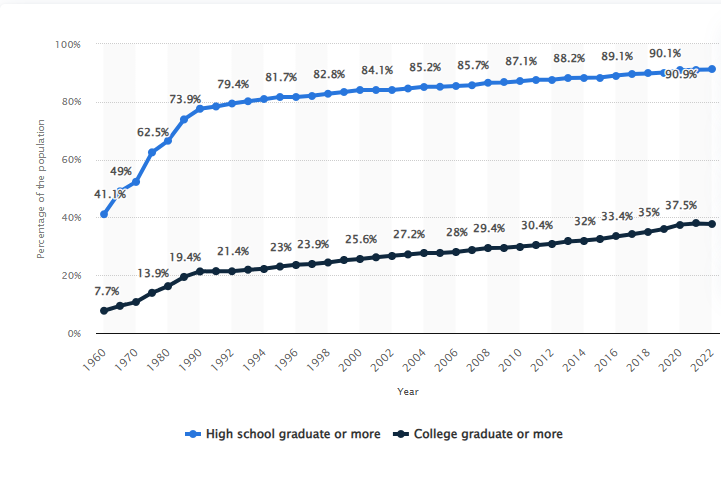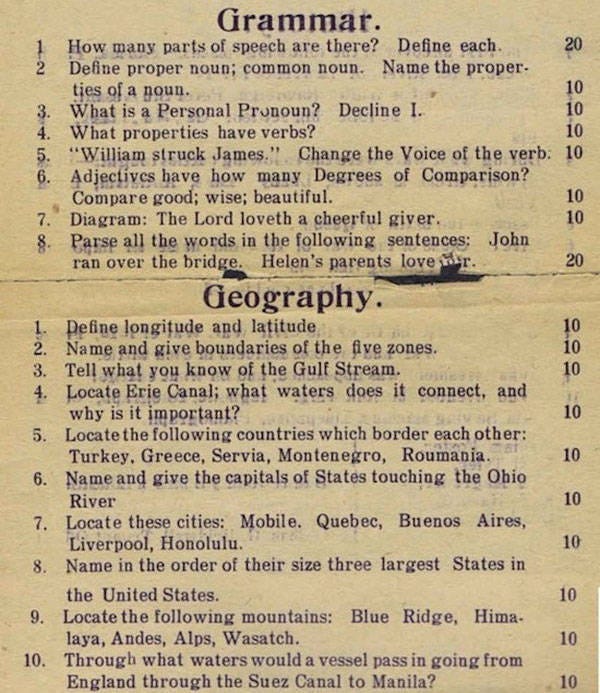In Defense of "Slacker" Classes
The current plight of young people entering the workforce is a disaster. College tuition rates have skyrocketed along with a noticeable decrease in the quality of education received. Worse, expectations have risen in Gen Z, a large proportion of which are inundated with tropes obsolete when Gen X attended University. A recent study showed that current college students expected to earn six figures right after graduation, while most will be making little more than half of that.
On the other side is the deterioration of the trades. Many skilled jobs, especially in home construction, fell victim to mass immigration that considerably lowered wages and created the aura of such work being for the unintelligent and low-status. Add in the massive gender disparity between University grads and the trades and prospects for family formation are precarious at best.
Many pundits, whether it’s Matt Walsh or Rick Lowe, pontificate that trades are on the rebound. You can start your career without a useless four-year-degree and begin your life early while one’s colleagues are ratcheting up massive debt while learning nothing to receive a useless degree.
On the other side, influencers of a more intellectual, abstract bent decry such messaging. They argue the University, for all of its flaws, is still the best outlet for forming political power and creating Elite Human Capital. They argue it’s insane to recommend trades to some of the best and brightest, the type who we actually need making policy and taking part in the upper-class laptop class and beyond. A political movement can’t simply be blue-collar workers outside the realms of power. You need a highly educated elite for leadership. College is the most effective way to gain skills and get credentials that will open up new opportunities.
None of these arguments are wrong. College is largely useless from a purely jobs-training standpoint for all but a few fields. Going to college to learn is a hard sell when most everything can be studied online for far cheaper. The main benefit, close contact with as professor, is a fantasy when most see their students as burdens to be tolerated. While the University is still wonderful for those who love learning for the sake of learning, the modern idea of college preparing students for the upper echelons of the workforce is outdated. However, the “Sheepskin effect” is real, and companies still place high value on a degree. It’s also true there aren’t many truly blue-collar guys as senators, representatives, or policy makers. Tradesmen are largely invisible to this cohort, and their paths never cross in day-to-day life. From a political standpoint, to become a tradesman is to become invisible.
It would be easy to encourage a middle-ground approach to the debate. Say that those who like working with their hands and have little interest in schooling should go into trades, and the more abstract types who work in theory would be better in college. This is more reasonable, but is also missing the mark, taking at face value the priors of managerialism, the very system at the heart of our woes.
The Purpose of Liberal Education
He apprehends the great outlines of knowledge, the principles on which it rests, the scale of its parts, its lights and its shades, its great points and its little, as he otherwise cannot apprehend them. Hence it is that his education is called “Liberal.” Knowledge Its Own End. A habit of mind is formed which lasts through life, of which the attributes are, freedom, equitableness, calmness, moderation, and wisdom; or what in a former Discourse I have ventured to call a philosophical habit.
The Idea of the University, John Henry Neumann
As College education has become ubiquitous, what’s forgotten is that even a High School education was not seen as a prerequisite for value in society just a few decades ago. Many people have great-grandparents who never went past the sixth grade. While it’s assumed that a high level of educational attainment is necessary for our more advanced society, the truth is people went along perfectly well learning on their own, with only those in the higher echelons of society feeling it necessary to expand their knowledge base through college.
Countless words have been spilled about the degradation of rigor that has went along with increasing enrollment. This is true for most fields, with the exception of mathematics and some hard sciences, that have increased significantly in difficulty the last 100 years. What’s forgotten is why the push for expanded educational opportunities reached such a pace.
Two drastically different schools of thought have emerged regarding what schooling was supposed to emphasize, the classical and the contemporary. On the classical side you have people like John Henry Neumann. He emphasized the core mandate of education was to create a well-rounded, virtuous person. By expanding his mind to many fields and points of thought, it would foster the humility and wide-lens view of reality that aided his spiritual development. The thought of practicality inside of liberal education was not even a secondary concern. One learns, debates, and studies to foster one’s virtue. In this view, theology needs to be a core aspect of education, as one’s eyes need to always be on the transcendent.
On the other side, emphasizing fostering democratic citizens who were ready for work and conformed to the dictates of working society, was John Dewey. Dewey often disparaged memorization and clinging to old traditions, claiming they were impediments to social progress. Contrary to more classical thinkers, he believed in a more pragmatic view of education, taking what was useful and throwing away the rest. An atheist, he believed morality was a social convention, allowed to change with everything else as cultural needs demanded.
The Dewey educational system clearly won in the United States. While classical schools are sprouting across the country as trust in public schooling collapses, they remain a blip on the radar. It’s a strange irony that the Dewey model, focusing on practicality and eschewing moralizing, has increasingly failed to create graduates ready to take on the challenges of everyday life while becoming stifled in a suffocatingly shrewish atmosphere of browbeating and self-righteous lecturing. History contains the worst aspects of Whigism, literature has been degraded to reading short sections of fundamental works, and advanced math classes have been removed in the name of equity. As moves are made to become college ready, schools have ignored fundamental skills for day-to-day living.
For all their advantages over the Dewey system, most classical schools have massive blind spots as well. A few generations ago, it was seen as a given that the family home would take care of teaching the children basic necessities of living, whether it be balancing a checkbook, cooking a meal, or doing basic home repairs. It’s increasingly the case children get no avenue to explore these basic things, meaning they may be able to read Cicero and recite Early American Poetry, but are unable to make a grilled cheese sandwich.
Shop, Home Economics, and Other “Dumb” Classes
Keep reading with a 7-day free trial
Subscribe to Social Matter to keep reading this post and get 7 days of free access to the full post archives.




